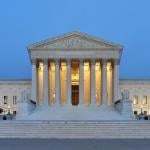Pugnare mihi non licet , St Martin is supposed to have said. Not everyone buys is. J. Fontaine, who edited the text of the life of Martin, says that such a declaration in Martin’s time is unbelievable: “an aggressive proclamation of conscientious objection, forty-two years after the Council of Arles, forty-three years after the victory of Milvian Bridge, when the chrismatory was stamped on the imperial flag and when the safety of the Christian empire tended to become identical with... Read more
















